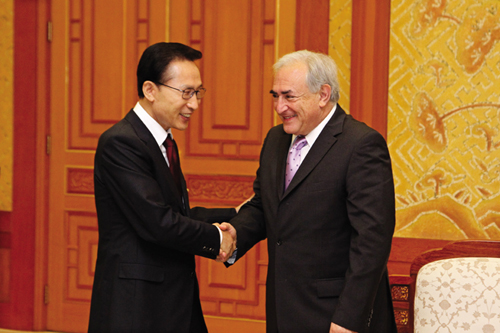IMF Eases Loan Provision System
Korea given credit for IMF¡¯s easing of loan conditions and continued work for both G20 and emerging nations

The International Monetary Fund (IMF) board of directors approved on Aug. 30 the revision of its loan provision system as proposed by South Korea, the chair nation of the upcoming G20 Summit in Seoul on Nov. 11-12, to improve the funding support system to help prevent financial crises as part of the discussion among G20 member nations on the establishment of a global financial safety net.
The revision called for the proper supply of funds by the IMF to prevent a financial crisis by amending its loan system, the G20 Preparatory Committee said recently.
The revision centered on the improvement of the Flexible Credit Line (FCL), which was launched in March 2009 to prevent financial crises by the IMF. So far, only Mexico, Colombia and Poland have used the facility. Any country with strong fundamentals can draw as much as 1,000 percent of its quota to flesh out its financial crisis. The revision called for the removal of the 1,000 percent limit on the withdrawal of funds from the facility and extend the withdrawal period to a year from six months after the approval on drawing funds.
The revision also called for the introduction of the Precautionary Credit Line (PCL), which is not the same as the FCL, but countries with sound financial policies can withdraw funds from the facility as precautionary measures. It would also mitigate problems for countries in financial crisis to take advantage of the FCL due to difficult approval procedures.
The move to amend the FCL was launched when President Lee Myung-bak proposed on Jan. 28 in his speech at the Davos Forum that the establishment of a global financial safety net be included as a major agenda item at the G20 Summit in Seoul. Chairman Sakong Il of the G20 Summit Preparatory Committee and others on the committee explained the details of the proposal such as its need and South Korea¡¯s position to key members of the G20, including the United States, France and Germany, beforehand.
In February, at the G20 vice finance ministerial meeting, they agreed to set up an expert group with Korea and Britain as co-chair nations and led the discussions on the revision on the basis of the recent shared experience of the global financial crisis. In the early stages, Germany, Italy and Canada, among others, were opposed to the proposal, with such emerging countries as Brazil and South Africa among those not so enthusiastic.
But in April, at the finance ministerial meeting, it was adopted as an agenda item for the G20 Summit and was also included in a joint statement issued at the end of the Toronto G20 Summit in June.
The summiteers at the Toronto meeting, agreeing on the need for a financial safety net, asked the financial ministers to come up with a set of policy measures for the proposed safety net and at the same time requested the IMF to improve its loan provision system. At present, financial experts and the IMF have been working to come up with diverse measures to cope with the summiteers requests.
The IMF revision of its loan provision system would enable speedy funding support to countries that have developed liquidity problems due to outside causes, while at the same time helping prevent the crisis from spreading to other countries, contributing to the stability of the global economy.
The IMF move would also extend to crisis prevention from crisis resolution. Korea played a key role along with the IMF by coming up with a detailed plan for the revision in coordination with each country involved and in the process of promoting the plan.
The earlier plan was to have the IMF revise its loan provision system around the time when the G20 Summit takes place in Seoul in November, but Korea urged the IMF to approve whatever issues that had so far attained mutual understanding as soon as possible in consideration of the financial crisis that erupted in Europe and threatened to be contagious.
The significance of the IMF action has been the successful introduction of the PCL as a base for developing countries that have been pursuing growth by opening their markets to set up a financial safety net and expand it.
Korea has been given credit for having done its share as the chair nation for the G20 Summit in November in upholding the interests of not only advanced countries, but also emerging countries in balance. A number of advanced countries initially were opposed to the creation of the PCL, concerned that it might increase the moral hazard to emerging nations.
Korea has been continuing its work to further strengthen the global financial safety net in cooperation with both the G20 member countries and the IMF. nw
President Lee Myung-bak shakes hands with Managing Director Dominique Strauss-Kahn of the International Monetary Fund (IMF) at Cheong Wa Dae on July 14.
3Fl, 292-47, Shindang 6-dong, Chung-gu, Seoul, Korea 100-456
Tel : 82-2-2235-6114 / Fax : 82-2-2235-0799